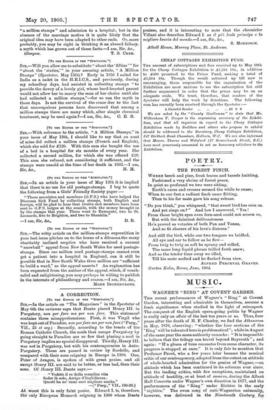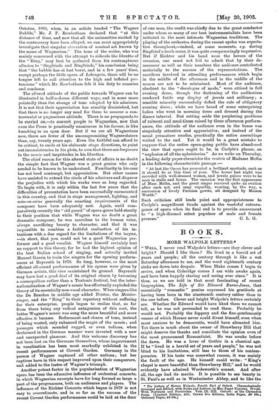MUSIC.
WAGNER'S "RING" AT COVENT GARDEN.
THE recent performances of Wagner's " Ring " at Covent Garden, interesting and admirable in themselves, assume a fresh significance when studied in the light of retrospect. The conquest of the English opera-going public by Wagner is really only an affair of the last ten years or so. Thus, four years after the death of H. F. Chorley, we find the Athena-win in May, 1876, observing: "whether the four sections of the ' Ring' will be tolerated here is problematical" ; while in August of the same year the same authority remarks : " It is impossible to believe that the trilogy can travel beyond Bayreuth" ; and again : " If a gleam of tune emanates from some character, its progress is stopped at once." It is only fair to mention that Professor Front, who a few years later became the musical critic of our contemporary, adopted from the outset an attitude of whole-hearted admiration for the genius of Wagner,—an attitude which has been continued in its columns ever since. But the leading critics, with few exceptions, maintained an attitude of hostility, or at least of reserve, during the Albert Hall Concerts under Wagner's own direction in 1877, and the performances of the " Ring " under Richter in the early "eighties." The swan song of anti-Wagnerian animosity, however, was delivered in the Nineteenth Centtiry, t4 October, 1888, when, in an article headed " The Wagner Bubble," Mr. J. F. Rowbotham declared that " at this distance of time, and now that all the animosities excited by the controversy have been allayed, we can most appropriately investigate that singular aberration of musical art known by the name of Wagnerism." The tone of the writer, who was mainly concerned with the attempt to ridicule the libretto of the " Ring," may best be gathered from his contemptuous allusion to " Siegfrieds and Biegfrieds," his conclusion being that " the bubble has at last burst, and in a few years' time, except perhaps the little opera of Lohengrin, there will be no tongue left to call attention to the high and inflated pre- tensions" which Mr. Rowbotham felt it his duty to examine and condemn.
The altered attitude of the public towards Wagner can be illustrated in half-a-dozen different ways, and in none more pointedly than the change of tone adopted by his admirers. It is not that their appreciation has sensibly diminished, but that there is no longer any need for them to assume a con- troversial or pugnacious attitude. There is no propaganda to be carried on,—to convert people to Wagnerism, now that even the Press is practically unanimous in his favour, is like knocking in an open door. But if we are all Wagnerians now, there are fewer of the uncompromising Wagnerolaters than, say, twenty years ago. Even the faithful can afford to be critical, to smile at his elaborate stage directions, to point out inconsistencies in his plots, to own that there are longueurs in the music and ineptitudes in his librettos.
The chief reason for this altered state of affairs is no doubt the simple fact that Wagner was a great genius who only needed to be known to be understood. Familiarity in his case has not bred contempt, but appreciation. But other causes have assisted to extend the circle of his admirers and disperse the prejudice with which his works were so long regarded. To begin with, it is only within the last few years that the difficulties of presentation have been successfully surmounted in this country, and that in stage management, lighting, and muse-en-scene generally the exacting requirements of the composer have been adequately met. Again, until com- paratively recently the " old guard " of opera-goers held stoutly to their position that while Wagner was no doubt a great dramatic composer, he was merciless to the human voice, always sacrificing beauty to character, and that it was impossible to combine a faithful realisation of his in- tentions with a due regard for the limitations of the larynx, —in short, that you could not be a good Wagnerian per- former and a good vocalist. Wagner himself certainly lent no support to this theory, for he had the highest opinion of the best Italian school of singing, and actually invited Manuel Garcia to train the singers for the opening perform- ances at Bayreuth in 1876. So long, however, as the most efficient all-round performances of his operas were given by German artists, this view maintained its ground. Bayreuth may have lost a good deal of its original charm by becoming a cosmopolitan rather than a Teutonic festival, but the inter- nationalisation of Wagner's music has effectually exploded the theory of its essentially non-vocal character. When singers like the De Reszkes in middle age added Tristan, the Meister- singer, and the " Ring " to their repertory without suffering for their enterprise, people began to realise that, so far from there being any radical antagonism of this sort, the better Wagner's music was sung the more beautiful and more effective it became. Refinement and charm of tone, instead of being wasted, only enhanced the magic of the music; and passages which sounded rugged, or even tedious, when declaimed in the German manner were invested with a new and unexpected glamour. And this welcome discovery has not been lost on the Germans themselves, whose improvement in vocalisation has been most markedly exhibited in the recent performances at Covent Garden. Germany in the person of Wagner captured all other nations ; but her captives have in this respect improved upon their conquerors, and added to the lustre of Wagner's triumph.
Another potent factor in the popularisation of Wagnerian opera has been the educative influence of orchestral concerts, in which Wagnerian excerpts have for long formed so large a part of the programmes, both on audiences and players. The influence of the Richter Concerts which began in 1879 is not easy to overestimate, and in so far as the success of the recent Covent Garden performances could be laid at the door under whom so many of our best instrumentalists have been initiated in the most intimate Wagnerian traditions. The
playing of the orchestra during the recent cycles was superla- tive throughout, indeed, at some moments, e.g. during Siegfried's death scene, it was quite overpoweringly impressive. But if Richter and his band were the heroes • of the occasion, one must not fail to admit that by their de- meanour as well as their numbers the audience contributed materially to the success of the representations. The
sacrifices involved in attending performances which begin in the middle of the afternoon and in the middle of the
season are not to be minimised. Most of the audience, obedient to the " decalogue of mode," were attired in full evening dress, though the darkening of the auditorium rendered futile any display of jewels and millinery ; a sensible minority successfully defied the rule of obligatory evening dress ; while we have heard of some enterprising ladies who went in morning dress and dressed during the dinner interval. But setting aside the perplexing problems of raiment and meal-times raised by these afternoon perform- ances, the attitude of the audience even in the boxes was singularly attentive and appreciative; and instead of the
usual premature exodus, practically the entire assemblage waited to the end. Yet it would be a great mistake to
suppose that the entire opera-going public have abandoned the view that opera ought to be, in Carlyle's phrase, an "explosion of all the upholsteries." As we write on Thursday, a leading daily paper chronicles the rentree of Madame Melba in the following characteristic passage :- " At last the Opera has presented a brilliant spectacle, such as it should do at this time of year. The house last night was crowded with well-dressed women, and jewels galore were to be seen in stalls and boxes. The occasion was the first appearance of Mme. Melba, and the great singer received quite an ovation after each act, and sang superbly, wearing, by the way, a succession of lovely Parisian gowns, all designed by Maison Worth."
Such criticism still lends point and appropriateness to Carlyle's magnificent tirade against the wasteful extrava-
gance of opera when its final end is to provide amusement to " a high-dizened select populace of male and female







































 Previous page
Previous page